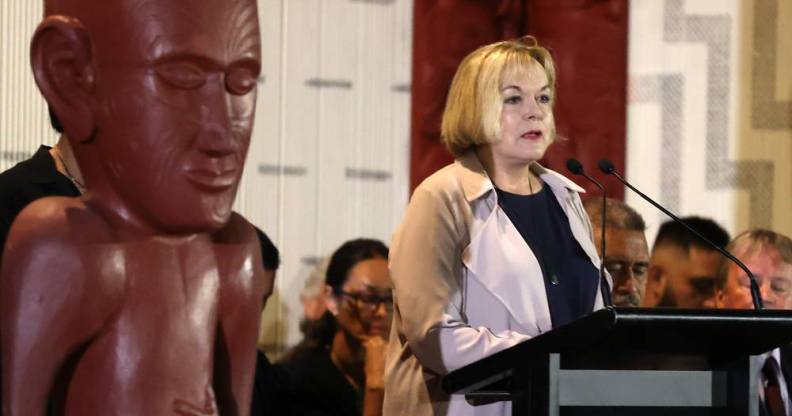New Zealand opposition leader had to Google what conversion therapy was before she’d back a ban

National leader Judith Collins speaks at the dawn service at the Waitangi treaty grounds on 6 February 2021 in Waitangi, New Zealand. The Waitangi Day national holiday celebrates the signing of the treaty of Waitangi on 6 February 1840 by Maori chiefs and the British Crown, that granted the Maori people the rights of British Citizens and ownership of their lands and other properties. (Photo by Fiona Goodall/Getty Images)
The leader of the opposition in New Zealand Judith Collins said her party will now back a ban on conversion therapy after she looked up the practice on Google.
Collins, leader of the National Party, said during the 2020 election campaign that wouldn’t commit to a ban on conversion therapy, though she abhorred the practice, admitting she needed to do more research. Both Jacinda Arden’s Labour Party and the Greens had, at the time, committed to a ban.
In early February, Collins said that her party didn’t yet have a view on the matter. But she’s now put her support behind the ban after she googled conversion therapy.
Collins confirmed the National Party is “all opposed to gay conversion therapy, so we will be looking forward to the bill being presented to us”. She said backing the ban is the “right thing to do”.
“None of us have any truck with anyone being bullied or being told they’re wrong when they’re dealing with their sexuality,” Collins said.
“Our decision was absolutely a consensus decision. Everyone was very happy with it.”
She continued: “I used this thing called Google to find out all about it [conversion therapy], then I also listened to people about it, the Young Nationals, who are very progressive on such issues, and they were very helpful.”
New Zealand’s Jacinda Arden has promised to end conversion therapy.
New Zealand’s leader Jacinda Arden has committed to banning conversion therapy by the end of this year. Her Labour Party had promised a ban ahead of the October 2020 election, but there has been little movement on the issue since.
Speaking at Waitangi Day (6 February), New Zealand’s national founding day, Arden promised that the government was “working on that policy now” and gave a timeframe for the introduction of a ban for the first time. She said the legislation will go out for consultation in the coming months.
“I want to see that legislation in the house this year,” Arden said.
But having the legislation in the house this year could mean the ban won’t pass or take effect until potentially 2022.
Arden denied claims the government is dragging its heels. She said: “We’ve committed to reform in this area, but we want to get it right… if we don’t get the law right, we won’t have the positive impact we need to have.”
Other countries have made progress on banning conversion therapy
A bill banning conversion therapy has passed the Upper House of Victoria, Australia, and will become law there. The bill passed 27 votes to nine on 4 February without amendments. The Change or Suppression (Conversion) Practices Prohibition Bill makes it illegal to try to change or suppress a person’s sexual orientation or gender identity in Victoria.
It also gives power to Victoria’s Equal Opportunity and Human Rights Commission to investigate and refer matters to the police.
Germany passed a ban on the advertising and practice of conversion therapy for minors in 2020. The European country joined Malta, Ecuador, Brazil and Taiwan in banning the harmful and dangerous practice.
Twenty states in the US and the District of Columbia have bans on conversion therapy for minors while North Carolina and Puerto Rico have partial bans on the practice. Florida, Georgia and Alabama currently have a preliminary injunction preventing enforcement of conversion therapy bans.
Twenty-six states have no state law or policy banning the practice.
The UK government is dragging its feet on conversion therapy, having committed to a ban in 2018. It’s a Sin star Stephen Fry has urged Boris Johnson to act without haste, calling the harmful practice “cruel” and “contemptuous”.

